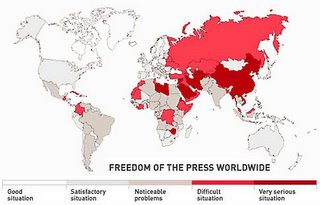Iran uls xevlelyn erx cho'loog jinxene utgaar xaaj exellee. Ameriktai xiij bui uls to'ryn temtsynx ni neg xelber bx. Gexdee ard tu'mniixee amyg taglaj, nu'dyg boon temtsel xiinee gej!
Robert Tait in Tehran
Monday December 4, 2006The Guardian
Iran yesterday shut down access to some of the world's most popular websites. Users were unable to open popular sites including Amazon.com and YouTube following instructions to service providers to filter them. (site...)
Iran: A "world power" of censorship
Dec 5, 2006Ars Technica
...When Internet users think of government censorship, they often think of China, which runs the world's largest filtering operation. But Iran's not far behind, and a recent spate of new blocks has now cut off access to Wikipedia, the Internet Movie Database, YouTube, and Amazon for most Iranians, according to recent reporting by the Guardian. (site...)
Uls ornuudyn xuvid xevlelyn erx cho'loo yamashuuxan bdag ve?
 (map - http://www.nationsonline.org/oneworld/map/press_freedom_map.htm)
(map - http://www.nationsonline.org/oneworld/map/press_freedom_map.htm)"Map of Press Freedom 2006 Edition": Now covering 194 countries and territories, Freedom of the Press: A Global Survey of Media Independence provides numerical rankings and rates each country's media as "Free," "Partly Free," or "Not Free."
Za tegeed Mongolynxoo tuxai sonirxii.
Freedom of PressFreedom
Mongolia (2006)
Freedom of speech and of the press are protected by law in Mongolia, and the government generally respects these rights in practice. Censorship of public information is banned under the 1998 Media Law, which also prohibits the government from owning or financing media outlets. The State Secrets Law limits access to government information to a degree, as many archived historical records have been given a classified status. Government officials have at times filed libel suits against media or launched tax audits against publications in the wake of critical articles. Libel charges are hard to defend against, because Mongolian law places the burden on the defendant to prove the truth of the statement at issue. To avoid being sued for libel, many independent publications practice a degree of self-censorship.
The government monitors media content for compliance with antiviolence, antipornography, and antialcohol content restrictions as well as compliance with tax laws. While no direct government censorship exists, journalists complain of indirect forms of censorship such as harassment and intimidation. In preparation for the 2005 presidential elections, the Mongolian Journalists Confederation issued ethical guidelines on election coverage, including the need to provide balanced coverage of the candidates and to refrain from accepting bribes for coverage.
Although independent print media outlets are common and popular in cities, the main source of news in the vast countryside is the state-owned Radio Mongolia. However, state-owned media are generally free of political control. The government is slowly implementing a 1999 law requiring state broadcast media to be transformed into public corporations. In October 2005, the coalition government announced plans to convert Mongol TV and Radio into a public broadcasting entity. Mongolians have access to local, privately owned television stations, English-language broadcasts of the BBC and Voice of America on private FM stations, and, in the capital city of Ulan Bator, foreign television programming via cable and commercial satellite systems. In this country of 2.5 million, only 220,000 people are internet users, a number calculated at less than 10 percent of the population. Owing to widespread poverty in Mongolia, the internet has yet to serve as a significant source of information.
http://www.freedomhouse.org/template.cfm?page=251&year=2006
No comments:
Post a Comment